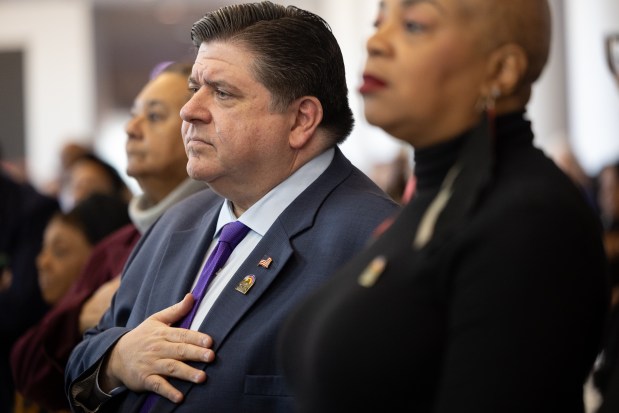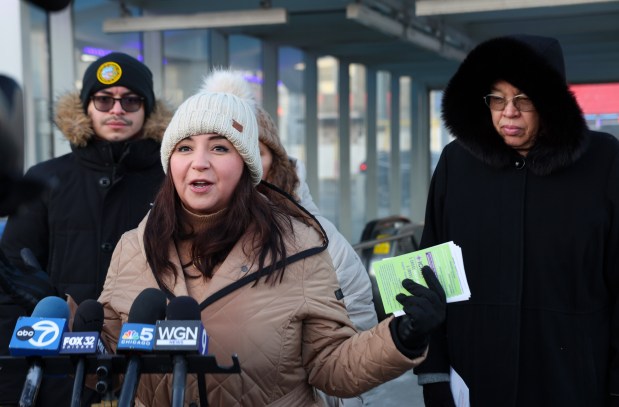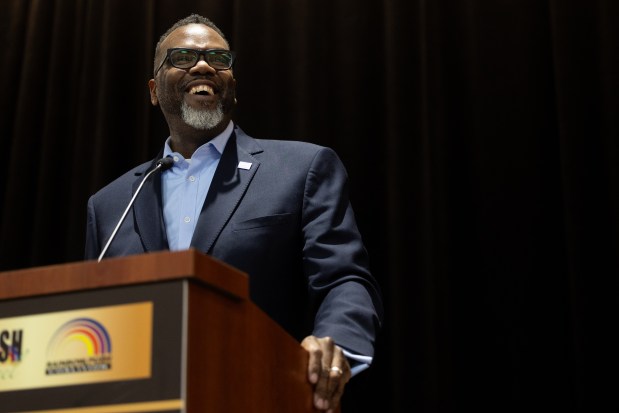Mayor Brandon Johnson and Gov. JB Pritzker delivered their opening salvos Monday against Republican President Donald Trump and his second term in the White House, setting a defiant tone in their defense of immigrant rights and other liberal causes over the next four years.
Pritzker and Johnson did not address Trump by name Monday ahead of Trump’s swearing-in as the 47th president. But during a Rainbow PUSH Coalition breakfast to honor Dr. Martin Luther King Jr., the two Democrats vigorously condemned the Republican leader’s agenda and character. Their public remarks, inside a Soldier Field suite, came amid a swirl of uncertainty and fear over rumored immigration raids in Chicago and evolving updates on executive orders the president vowed to sign.
The mayor sought to strike an energetic tone as he employed religious imagery in describing the challenge ahead for Chicago leaders.
“This transition that we are experiencing, you all, is only but a moment in time,” Johnson said. “The Bible says that before that great day, the lawless man has to be revealed first. … What does that great day look like? It does certainly look like — in the spirit of Dr. King — it looks like true leadership. And true leadership, you all, is controversy. I may know a little bit about that now.”
Johnson, who has weathered a rocky past several months in office, finds himself in the national spotlight as Trump’s border czar, Tom Homan, has called him out directly while declaring the nation’s third-largest city ground zero for mass deportations. The Wall Street Journal, followed by other outlets, reported that Immigration and Customs Enforcement raids would start Tuesday in Chicago, though Homan appeared to walk that back after the reports.
How the freshman, progressive Chicago mayor responds to threats against immigrants could shift the course of his political future during a moment when his leadership has come under fire by progressives and moderates alike. Throughout Trump’s first term, mayors Rahm Emanuel and Lori Lightfoot pounced on opportunities to cast themselves as an urban bulwark against GOP attacks on immigrants and other groups.
“As the city of Chicago, we will not bow down to the oligarchs. We will not bow down to a golden calf,” Johnson said, a reference to the Bible’s warning against false idols. “Even as the lawlessness gets revealed, so does the character of Chicago. And we are the greatest love story in America.”
Pritzker spoke in a plainer but still assertive tenor.
“As a new administration takes office less than two hours from now, across America our most vulnerable communities are about to contend with new uncertainty about their future,” the governor said. “But here in Illinois, let there be no doubt: We will not go back. … To all who are being made to feel unsafe and reduced by a takeover of the federal government, by those who seek to enrich themselves at the expense of the good people of Illinois, we will not stand idly by.”

The governor was scheduled to answer questions from reporters later Monday afternoon.
In Washington, D.C., Trump’s team announced a host of upcoming executive orders that would end birthright citizenship and asylum protections and create a joint federal and local task force to deport criminal gang members. Many of those moves are expected to be legally challenged.
After being sworn in as the 47th president, Trump rattled off a host of tactics to carry out his mass deportation plan. That included declaring a national crisis at the U.S. southern border, reinstating a “Remain in Mexico” policy for migrants, sending the military to the border, designating drug cartels as terrorist organzations and invoking the Alien Enemies Act of 1798.
“As commander-in-chief, I have no higher responsibility than to defend our country from threats and invasions, and that is exactly what I am going to do,” Trump said. “We will do it at a level that nobody has ever seen before.”
In Illinois, the 2017 TRUST Act restricts local law enforcement in the state from helping the federal government in immigration enforcement matters. Chicago for decades has held the designation of a sanctuary city, meaning it limits or prevents cooperation with federal immigration authorities. Johnson and the City Council have reaffirmed that commitment.
As he left the MLK breakfast, Johnson did not answer a reporter’s questions about how he would respond to a federal task force in Chicago or on the other immigration orders.
U.S. Rep. Jesús “Chuy” García, a Democrat who represents a large Mexican immigrant enclave in Little Village, remarked on the news: “It’s showing hate and vitriol and demonstrating that he will be a divider in chief.”
“The Constitution has not been suspended,” García, who joined a group of Chicago’s congressional delegation in ditching the inauguration, said at the Soldier Field event. “The president cannot suspend it. And we have fought these fights before, and we have prevailed.”
On Sunday, the Johnson administration briefed aldermen on city preparations for potential threats to immigrants under Trump. Top mayoral deputies told City Council members that a “Transition of Power” task force was assembled shortly after the November election focused on three categories: community safety, infrastructure, and policy, according to several sources who attended the meetings but asked not to be identified because they weren’t authorized to speak on them.
During the briefings, Johnson’s chief operating officer, John Roberson, nodded to the possibility that GOP control of the presidency and Congress could mean Washington cuts off federal funding to Chicago or Illinois, the sources said. That concern is shared by multiple Chicago Democrats in Congress who hope to work out a plan soon.
It was unclear whether City Hall was in contact with Trump’s team before Monday. Johnson told the Sun-Times he hopes for a meeting with the president.
The mayor was in Washington this past weekend and flew back Sunday night after speaking at the U.S. Conference of Mayors. His remarks sought to cast this moment as one of Democratic leaders on the front lines of defending their cities against a new era of attacks against immigrants.
Earlier Monday morning, a cadre of politicians and immigrant advocates huddled under a Blue Line stop in Avondale to pass out “Know Your Rights” pamphlets to people on their morning commute. Afterward, they planned to canvass businesses, laundromats, bakeries and more to inform residents on how to respond to potential ICE interactions.

U.S. Rep. Delia Ramirez, a Democrat from Chicago, said in Spanish: “We want people to know that they have rights, that they don’t need to show their documentation to federal immigration officials, that they are protected by the Constitution, too.”
Asked if whether she supported deporting those with criminal backgrounds, Ramirez said she doesn’t back policies that remove people from the U.S. who have done nothing but contribute to the economy.
“We need to be careful,” she said. “How do they define a criminal? A child who entered this country without papers … that’s a criminal? So we have to be very careful about how we talk about people.”
Graciela Guzman, a newly sworn-in state senator whose parents escaped the El Salvadoran civil war, said she’s already noticed that her neighborhood is moving substantially slower than normal. Many friends, family and neighbors have shared that they are staying home from work and school, she said.
“How do we center human rights in this time?” Guzman asked. “My district deserves that. Every district across the state deserves that. Our country deserves that.”
The group huddled under the station’s heat lamp shouted at morning commuters: “Know your rights! ¡Conoce tus derechos!”



